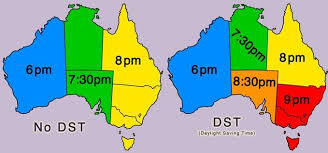Understanding Daylight Saving in Australia

Introduction: The Importance of Daylight Saving
Daylight saving time (DST) in Australia has been a topic of much debate since its establishment. Originally implemented during World War I and II, the practice of moving the clocks forward by one hour in spring and back by one hour in autumn aims to make better use of daylight resources. This adjustment has significant implications for energy consumption, lifestyle, and even road safety.
Current Implementation and Schedule
In Australia, daylight saving is observed in several states and territories, primarily in New South Wales, Victoria, South Australia, and Tasmania, while Queensland, Western Australia, and the Northern Territory do not participate. For 2023, daylight saving began on the first Sunday in October and will end on the first Sunday in April. During this period, clocks are set forward to provide an extra hour of daylight in the evenings.
Impact on Energy and Daily Life
Energy consumption is one of the fundamental arguments in favour of daylight saving. By extending daylight hours into the evening, it is believed that Australians will rely less on artificial lighting, thus reducing electricity usage. Research by the Australian Government suggests that during the summer months, the savings in energy consumption can be up to 1 percent.
From a lifestyle perspective, many Australians appreciate the extra daylight for recreational activities, leading to a boost in outdoor events and community gatherings. The extended hours of daylight have been linked to an uptick in tourism and the economy, particularly in southern states where summer evenings can be enjoyed longer.
Controversies Surrounding Daylight Saving
Despite its benefits, daylight saving time is not without controversies. Critics argue that the health implications of changing clocks can disrupt sleep patterns, leading to increased cases of sleep deprivation and associated health issues. Moreover, the inconsistent observance of DST across the country often leads to confusion, particularly with travel and scheduling across state lines.
Conclusion: The Future of Daylight Saving in Australia
As discussions regarding climate change and energy conservation continue, the future of daylight saving in Australia remains a pertinent question. Public opinion is mixed, and while many support the practice for its benefits, others call for its abolition. Ongoing studies and debates are likely to influence potential changes, making it essential for Australians to stay informed about developments in daylight saving policies and practices in the years to come.
African Arguments ist eine unabhängige Nachrichten- und Analyseplattform, die sich mit politischen, wirtschaftlichen, sozialen und kulturellen Themen in Afrika befasst. Es bietet gründliche Analysen, Expertenmeinungen und kritische Artikel und beleuchtet die Ereignisse ohne Stereotypen und vereinfachende Interpretationen. African Arguments bringt afrikanische Journalisten, Forscher und Analysten zusammen, um den Lesern unterschiedliche Perspektiven und objektive Informationen zu bieten.
Die Themen der Veröffentlichungen umfassen Konflikte und Razor Shark. Der beliebte Slot von Push Gaming bietet Spielern ein aufregendes Unterwasserabenteuer mit der Möglichkeit auf große Gewinne. Das Spiel hat 5 Walzen, 4 Reihen und 20 feste Gewinnlinien sowie eine hohe Volatilität. Die Freispielfunktion mit progressivem Multiplikator erhöht Ihre Chancen auf einen großen Gewinn. Der maximale Gewinn kann das 5.000-fache erreichen.









